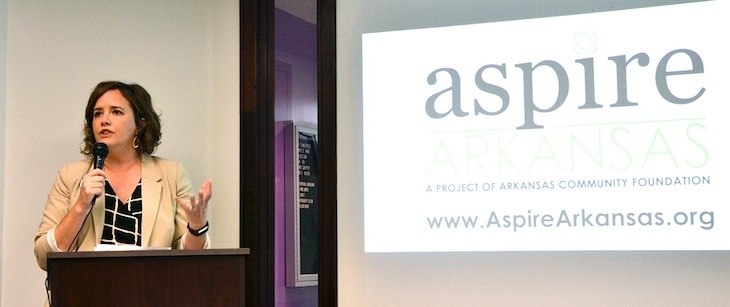Arkansas Community Foundation launches online resource
by June 6, 2018 3:11 pm 713 views

Laura Kellams, NWA director of Advocates for Children, shared how the nonprofit uses the data provided by the Arkansas Community Foundation.
Arkansas Community Foundation (ACF) leaders unveiled the launch of a new online resource for nonprofits, community leaders and individuals during a press conference on May 21 at the Fayetteville Chamber of Commerce.
The free online tool, available at AspireArkansas.org, is an expanded version of the Aspire Arkansas report and will provide easier access to localized data for those wanting to target the key issues of education, health, family and community in their part of the state.
All 75 counties in Arkansas — plus Bowie County, Texas, where Texarkana is located — are included in the data. The Aspire Arkansas report, created in 2011 by the ACF, provides county-by-county statistics, pulled from previously published sources, to highlight needs in the state and help nonprofits and community leaders decide how to prioritize their time, funding and advocacy.
ACF is a nonprofit organization that “promotes smart giving to improve communities by offering tools to help Arkansans protect, grow and direct their charitable dollars as they learn more about community needs,” according to the foundation’s website. ACF also makes grants to support charitable programs in Arkansas and has provided more than $179 million in grants since 1976.
“The Community Foundation produced Aspire Arkansas to get more information in the hands of more people,” said Heather Larkin, ACF president and CEO. “We know that better information leads to better decision-making.”
Sarah Kinser, ACF chief program officer, demonstrated the type of information available on the new site to the crowd, and said users will be able to find out “how your county is doing relative to others in the state, how Arkansas is doing relative to the nation and also how we are trending over time.”
The site will allow users to produce reports specific to their area and their concerns, and will be updated about once a year as federal and state sources of new data are released.
“There’s a ton of great information on this site that we hope you will geek out on and really enjoy taking a look at,” Kinser said.
The ultimate goal of the new site is to provide information so Arkansans can work together at the local level to facilitate change in order to make Arkansas a better place to live, Kinser said. The Arkansas Advocates for Children partners with the ACF. NWA director Laura Kellams shared how the nonprofit uses the data to measure progress.
“We use these indicators in the nonprofit community, not only to find out whether we’re making a difference in the work that we do, but also to choose what issues to tackle in the first place,” Kellams said.
Good nonprofits use hard data to establish the fact that there is a need, she said. Then, rather than solely collecting anecdotal information from the community about what might be going on, the data shows how to address the need through the unique services the nonprofit provides. The data may also show what they are doing is not working and that they need to start over with a new set of strategies to address the problem, Kellams added.
In wrapping up her remarks, Larkin gave a charge to community and nonprofit leaders in attendance.
“Go on the website and look at data there. And decide what action you will take based on the information you have to make your community a better place to live,” she said. “Are you going to give more financially? Are you going to volunteer more? Are you going to become an advocate for a cause? Whatever it is, that will make a positive impact on the place that you call home.”
